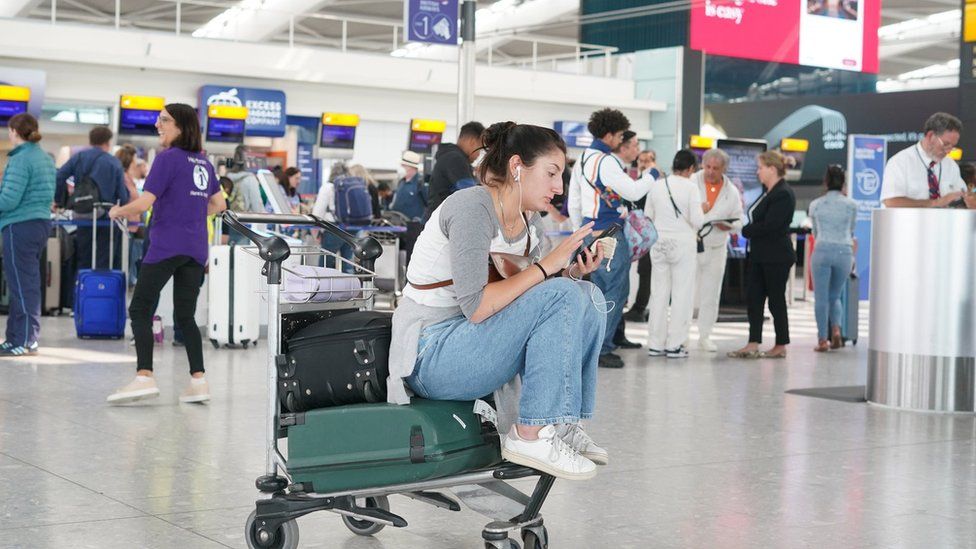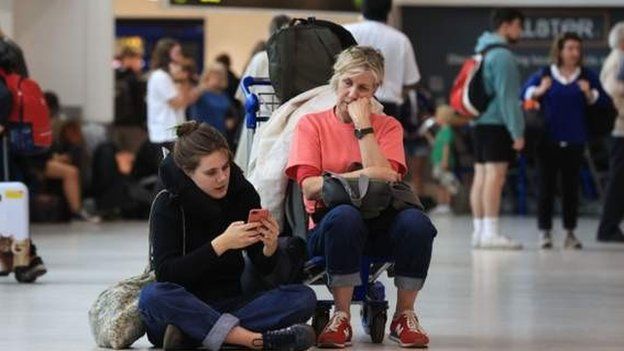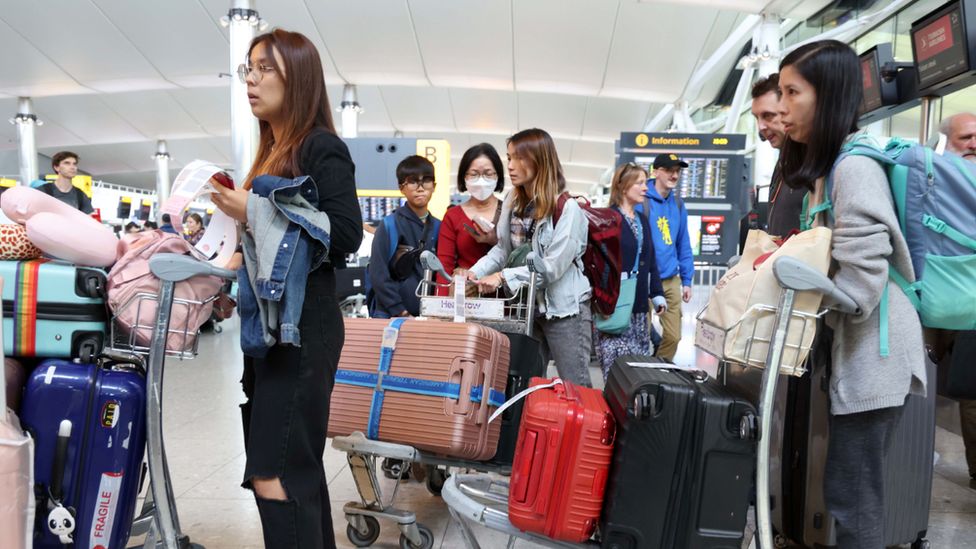
The airline industry is calling for compensation in the wake of flights chaos over the August bank holiday.
The UK’s air traffic control system was brought down in a “one in 15 million” event, the air traffic control boss said on Wednesday.
Hundreds of flights were delayed or cancelled as a result.
Industry group Airlines UK said that carriers had incurred huge costs in providing lodging and putting on more flights for customers.
Tim Alderslade, chief executive of Airlines UK, said: “Airlines cannot be the insurer of a last resort.”
He called for accountability from Nats, the company which controls the UK’s air traffic services, and said the industry body is talking with the government about options for redress.
“We can’t have a situation whereby airlines carry the can every time we see disruption of this magnitude,” he added.
The group represents the likes of British Airways, EasyJet, Jet2, Ryanair, Virgin Atlantic and Tui.
EasyJet boss Johan Lundgren also said that “many questions are still left unanswered” after Nats published an initial report into what exactly caused the system failure.
“An incident on this scale should not have happened and must not happen again,” he added, saying that he was looking forward to a more “wide-ranging” review.
How did airport chaos unfold?
In its initial report published on Wednesday, Nats said that at 08:32 on 28 August, its system received details of a flight which was due to cross UK airspace later that day.
Airlines submit every flight path to the national control centre; these should automatically be shared with Nats controllers, who oversee UK airspace.
The system detected that two markers along the planned route had the same name – even though they were in different places. As a result, it could not understand the UK portion of the flight plan.
This triggered the system to automatically stop working for safety reasons, so that no incorrect information was passed to Nats’ air traffic controllers. The backup system then did the same thing.
This unfolded in just 20 seconds.
Engineers struggled to fix the problem, and called in the manufacturer for help.
Martin Rolfe, chief executive of Nats, said that the system did “what it was designed to do, i.e. fail safely when it receives data that it can’t process”.
He described it as “a one in 15 million flight plan that we received”, meaning the engineers took a few hours to work out a situation they were not familiar with.
It was the first time this had happened in the five years the software had been operating, having processed more than 15 million flight plans, he said.
Nats, formerly known as National Air Traffic Services, said it had taken measures to prevent the situation from happening again.
“We were in the situation where we had thousands of flights in the air and we received a piece of data which our systems could not process. If that happened today, we would absolutely be able to deal with them,” Mr Rolfe told the BBC’s Today programme.
The UK’s aviation regulator, the Civil Aviation Authority (CAA), has also announced an independent review, expected to report in a few months’ time. The watchdog said it could take action if Nats had breached “statutory and licensing obligations”.
- How a four-hour fault triggered three days of air chaos
- We can avoid chaos in future – air traffic boss
Mr Rolfe apologised again to customers whose holidays were affected during an interview with the BBC.
“We absolutely understand how disruptive the events over the bank holiday were for people.”
With planes and crew out of position and most flights already booked up, many people found themselves stuck abroad on what is usually a big day for travel – a bank holiday – facing long waits to get home.
As last week went on, airlines put on extra flights in an attempt to clear the backlog.
But questions have remained over how one flight plan could cause such huge disruption. For a time, flight plans had to be processed manually, which meant restrictions were imposed on the number which could be handled.
The system was back online just before 14:30 BST. It wasn’t until just after 18:00 that restrictions on air traffic were fully removed.
Both Nats and the CAA say safety was never compromised.
The Nats report also cites Eurocontrol data as showing 5,592 flights operated in UK airspace on 28 August, 2,000 (or 25%) fewer than had been expected. This includes cancelled flights and those which avoided UK airspace.
Nats believes there were about 1,500 cancellations on the Monday alone, with all UK airlines affected.
“Systems of this nature are used throughout the world and this scenario has never been encountered before,” wrote the CAA after its initial assessment of Nats’s report detailing what went wrong.
The CAA said the event “is now understood and should it reoccur would be fixed quickly with no effect to the aviation system”.
Transport Secretary Mark Harper said that he was pleased to receive confirmation that there were no safety issues.
He added that the independent review from the aviation watchdog will “dig deeper into this event and understand whether there are any further steps to be taken to improve the resilience of the air traffic control system”.

How have you been affected by the air traffic control outage? You can get in touch by emailing haveyoursay@bbc.co.uk.
Please include a contact number if you are willing to speak to a BBC journalist. You can also get in touch in the following ways:
- WhatsApp: +44 7756 165803
- Tweet: @BBC_HaveYourSay
- Upload pictures or video
- Please read our terms & conditions and privacy policy
If you are reading this page and can’t see the form you will need to visit the mobile version of the BBC website to submit your question or comment or you can email us at HaveYourSay@bbc.co.uk. Please include your name, age and location with any submission.
Related Topics
- Aviation accidents and incidents
- Travel
- Civil Aviation Authority
- Air travel
-
How a four-hour fault triggered three days of air chaos
-
3 days ago

-
-
Air traffic fault sees Bank Holiday passengers stuck
-
29 August

-





